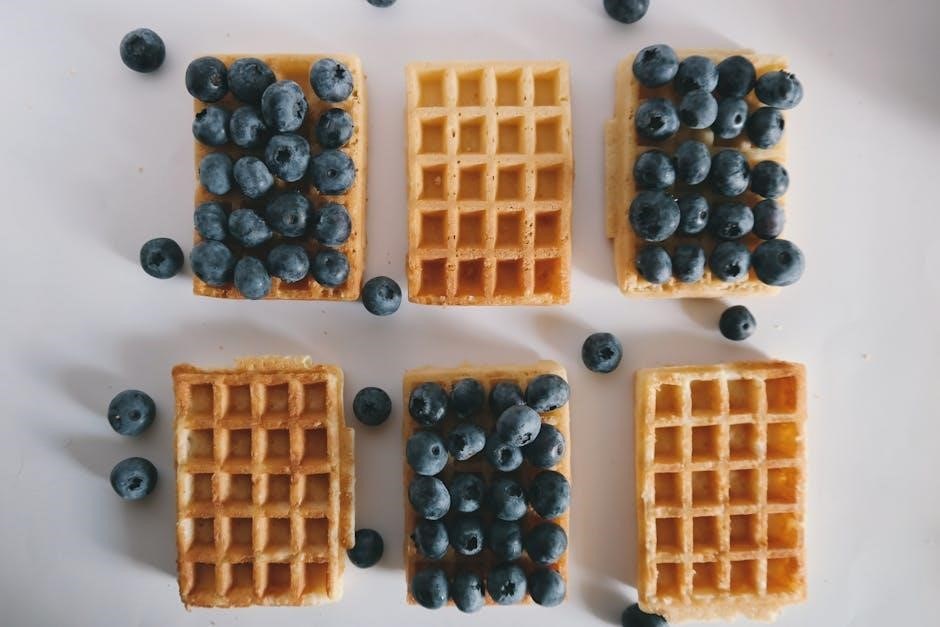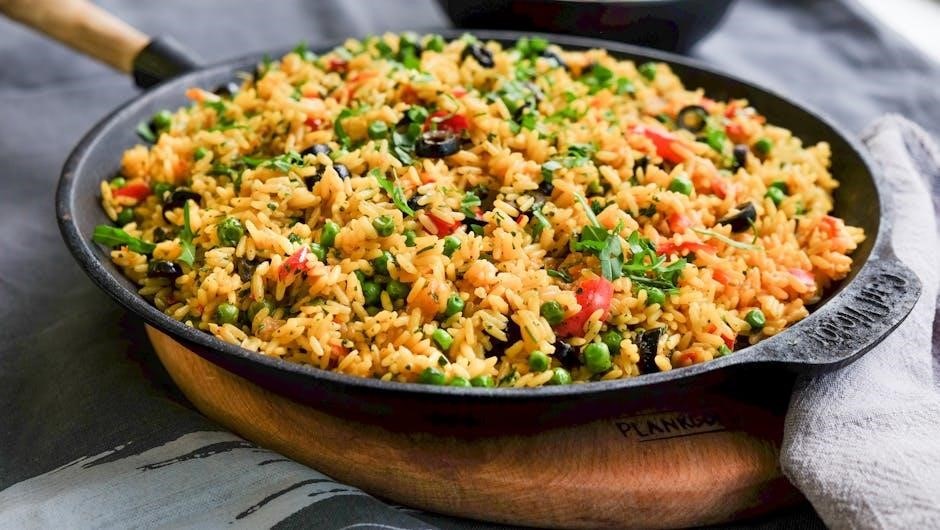This structured 7-day meal plan is designed to support kidney health by balancing nutrients and controlling intake of critical elements like protein‚ sodium‚ and potassium‚ helping manage kidney disease effectively.
Overview of the Importance of Diet in Managing Kidney Disease
Diet plays a crucial role in managing kidney disease‚ as it helps control the progression of the condition and prevents complications. A well-structured meal plan ensures proper nutrient balance‚ minimizing strain on the kidneys. Key nutrients like protein‚ sodium‚ potassium‚ and phosphorus must be carefully managed to maintain kidney function. A tailored diet can help reduce waste buildup in the blood‚ lowering the risk of further kidney damage. Additionally‚ it supports overall health by controlling blood pressure‚ blood sugar‚ and cholesterol levels. By adhering to a kidney-friendly diet‚ individuals can slow disease progression and improve quality of life. Consulting a registered dietitian or healthcare provider is essential to create a personalized plan that addresses specific needs and stages of kidney disease.

Key Nutritional Considerations for Kidney Disease
Managing kidney disease requires careful control of protein‚ sodium‚ potassium‚ and phosphorus intake to reduce kidney strain and maintain overall health and function effectively.

Protein Intake Guidelines
For individuals with kidney disease‚ controlling protein intake is crucial to reduce kidney strain. The recommended daily protein intake typically ranges from 45 to 65 grams‚ depending on the severity of the disease and individual needs. Emphasize lean protein sources such as poultry‚ fish‚ and plant-based options like beans and legumes. Avoid high-purine foods‚ such as red meat and organ meats‚ as they can increase uric acid levels. Portion control is essential‚ and meals should be balanced with low-protein‚ high-fiber foods to support overall nutrition. Consulting a renal dietitian can help tailor protein intake to specific health requirements and ensure meals are both nutritious and kidney-friendly.
Sodium and Potassium Restrictions
Managing sodium and potassium intake is vital for individuals with kidney disease to prevent complications. Sodium should be limited to less than 2‚300 mg per day to avoid high blood pressure‚ which can further strain the kidneys. Processed foods‚ canned goods‚ and table salt are primary sources of excess sodium and should be minimized. Potassium intake should range between 1‚500 to 3‚000 mg daily‚ depending on the stage of kidney disease. High-potassium foods like bananas‚ spinach‚ and oranges should be consumed in moderation or avoided if potassium levels are elevated. Incorporating low-potassium alternatives‚ such as apples or green beans‚ can help maintain balance. Monitoring these minerals ensures a kidney-friendly diet and supports overall health. Always consult a healthcare provider or dietitian for personalized guidelines tailored to your condition.
Phosphorus Management in the Diet
Phosphorus management is crucial for individuals with kidney disease‚ as impaired kidneys struggle to filter excess phosphorus‚ potentially leading to complications like bone disease. Limiting dietary phosphorus is essential‚ with recommended intake typically ranging between 800-1‚000 mg per day. Avoid high-phosphorus foods such as processed meats‚ dairy products‚ and cola beverages. Opt for phosphorus-free alternatives‚ like herbal teas instead of sodas‚ and choose fresh vegetables over processed or canned varieties. Protein sources should be lean and low in phosphorus‚ such as egg whites or fish. It’s important to read food labels carefully‚ as many processed foods contain hidden phosphorus additives. Incorporating lower-phosphorus grains‚ such as rice or corn‚ can also help manage intake. Always consult a dietitian to tailor phosphorus restrictions to your specific kidney function and health needs‚ ensuring a balanced and safe diet. Proper phosphorus management supports kidney health and prevents long-term damage.

7-Day Meal Plan Structure
This 7-day meal plan offers balanced nutrition with three meals and two snacks daily‚ ensuring variety and adherence to kidney-friendly dietary guidelines for optimal health.
Day 1: Breakfast‚ Lunch‚ Dinner‚ and Snacks
Start your week with a kidney-friendly breakfast featuring a dairy-free yogurt parfait topped with fresh berries and a sprinkle of low-potassium granola. Pair this with a veggie scramble made with eggs‚ bell peppers‚ and mushrooms‚ served alongside whole-grain toast. For lunch‚ enjoy a grilled chicken breast seasoned with low-sodium herbs‚ accompanied by a side of steamed green beans and a small portion of brown rice. Dinner includes baked salmon (4oz)‚ roasted asparagus‚ and a quinoa pilaf. Snacks include apple slices with a small amount of peanut butter and baby carrots with a low-sodium hummus dip. This meal plan is designed to balance nutrients while adhering to kidney disease dietary guidelines.
Day 2: Balanced Nutrition and Meal Variety
Begin Day 2 with a hearty breakfast of oatmeal topped with a small serving of fresh berries (such as strawberries or blueberries) and a splash of almond milk. Add a side of a hard-boiled egg for protein. For lunch‚ enjoy a mixed green salad with grilled chicken breast‚ low-potassium vegetables like cucumber and carrots‚ and a light vinaigrette dressing. Dinner features a baked turkey breast served with roasted zucchini and mashed cauliflower. Snacks include a small handful of fresh cucumber slices and a few rice cakes. This day emphasizes variety while maintaining kidney-friendly nutrient levels‚ ensuring a balanced intake of protein‚ fiber‚ and essential vitamins. The meals are designed to be flavorful and satisfying while adhering to sodium‚ potassium‚ and phosphorus guidelines for kidney health.
Day 3: Incorporating Lean Proteins and Fresh Vegetables
Start Day 3 with a breakfast of scrambled eggs (using egg whites) seasoned with herbs like parsley and dill‚ served alongside a slice of whole-grain toast. For lunch‚ enjoy a quinoa salad mixed with chopped cucumber‚ bell peppers‚ and carrots‚ dressed with a low-sodium vinaigrette. Dinner features baked cod (a lean protein) paired with steamed green beans and a side of roasted sweet potatoes. Snacks include a small serving of fresh apple slices with a dollop of peanut butter. This day prioritizes lean proteins and fresh vegetables to support kidney function while keeping sodium‚ potassium‚ and phosphorus levels in check. The meals are nutrient-dense‚ flavorful‚ and designed to provide balanced nutrition for individuals managing kidney disease. Fresh herbs and spices add variety without compromising dietary restrictions.

Day 4: Low-Sodium and Potassium-Friendly Options
On Day 4‚ focus on meals that are naturally low in sodium and potassium while maintaining flavor and nutrition. Start with breakfast featuring cream of rice cereal topped with a drizzle of honey and a side of canned fruit‚ such as mandarin oranges. For lunch‚ enjoy a grilled chicken breast seasoned with herbs like thyme and rosemary‚ paired with a small serving of boiled potato and a mix of low-potassium greens like lettuce and cucumber. Snack on a small portion of rice cakes with a light spread of peanut butter. Dinner includes baked turkey breast with steamed zucchini and a side of whole-grain pasta. This day emphasizes meals that are gentle on the kidneys while providing essential nutrients and variety. Each dish is carefully selected to ensure sodium and potassium levels remain within recommended limits‚ supporting overall kidney health.

Day 5: Whole Grains and Healthy Fats
Day 5 focuses on incorporating whole grains and healthy fats to provide sustained energy and support heart health. Start with a hearty breakfast of oatmeal topped with fresh berries and a drizzle of honey‚ alongside a slice of whole-grain toast with a small amount of avocado spread. For lunch‚ enjoy a quinoa salad mixed with chopped cucumber‚ carrots‚ and a light vinaigrette dressing. Snack on a small handful of unsalted almonds and a few slices of fresh apple. Dinner features grilled chicken breast seasoned with herbs‚ served with a side of roasted sweet potatoes and steamed green beans. This day emphasizes the importance of whole grains for fiber and healthy fats for overall well-being‚ while keeping sodium and potassium intake in check. These nutrient-dense meals help maintain energy levels and support kidney function without overloading on harmful substances.
Day 6: Fish and Plant-Based Protein Sources
Day 6 highlights the inclusion of fish and plant-based proteins to boost nutrition while managing kidney-friendly guidelines. Breakfast features scrambled eggs with spinach and a slice of whole-grain toast. Lunch includes a grilled salmon fillet (4 oz) with a side of mixed greens and a balsamic vinaigrette‚ along with a small portion of cooked brown rice. Snacks consist of apple slices with a tablespoon of peanut butter and a handful of unsalted almonds. Dinner focuses on a lentil and vegetable stir-fry‚ seasoned with herbs‚ and served over a bed of quinoa. This day emphasizes the benefits of omega-3 rich fish like salmon for heart health and plant-based proteins like lentils‚ which are lower in phosphorus and ideal for kidney health. These meals are balanced to ensure adequate nutrition while adhering to sodium‚ potassium‚ and phosphorus limits‚ making them suitable for individuals managing kidney disease.
Day 7: Refreshing and Nutrient-Rich Meals
Day 7 focuses on light‚ refreshing meals packed with essential nutrients to support kidney health. Breakfast includes a fruit parfait with non-dairy yogurt‚ granola‚ and fresh berries. Lunch features a grilled chicken wrap with low-sodium hummus‚ cucumber‚ and lettuce in a whole-grain tortilla‚ paired with a side of sliced bell peppers. Snacks include baby carrots with a tablespoon of hummus and a small orange. Dinner highlights a vegetable and bean salad with a herbal vinaigrette‚ accompanied by a slice of whole-grain bread. This day emphasizes hydration with water-rich foods like cucumbers and oranges‚ while keeping sodium‚ potassium‚ and phosphorus levels in check. These meals are designed to be flavorful‚ nutritious‚ and easy to prepare‚ ensuring a balanced end to the week while supporting kidney function.

Additional Tips for a Kidney-Friendly Diet
Monitor sodium intake‚ choose lean proteins‚ and stay hydrated. Incorporate fresh fruits and vegetables while controlling portion sizes to maintain a balanced and kidney-friendly diet.
Snack Ideas and Portion Control
Snacking is essential for maintaining energy levels‚ but it’s crucial to choose kidney-friendly options. Fresh vegetable sticks with hummus‚ apple slices with peanut butter‚ or a small handful of unsalted nuts are great choices. Portion control is key to managing sodium‚ potassium‚ and phosphorus intake. Opt for low-sodium crackers or rice cakes as alternatives. Avoid processed snacks and focus on whole‚ unprocessed foods. Drinking water between meals helps with hydration without overloading on fluids. For patients with advanced kidney disease‚ portion sizes may need to be adjusted further. Always consult a dietitian to tailor snacks to individual needs and ensure they align with overall dietary goals for kidney health;
Hydration and Fluid Management
Proper hydration is vital for kidney function‚ but overhydration can strain the kidneys. Patients with kidney disease should drink fluids in moderation‚ typically 1.5 to 2 liters daily‚ unless otherwise directed by a healthcare provider. It’s important to balance fluid intake with electrolyte levels‚ especially potassium and sodium. Avoid excessive consumption of high-sodium beverages like sports drinks. Herbal teas‚ water‚ and diluted fruit juices are recommended. Monitoring urine output and color can help gauge hydration levels—pale yellow urine indicates proper hydration. Limit fluids high in potassium‚ such as coconut water and orange juice. Tracking daily fluid intake using a journal or app can help maintain consistency. Always consult a dietitian to adjust fluid intake based on individual kidney function and medical guidelines.

A well-structured 7-day meal plan supports kidney health by balancing nutrients and managing key dietary restrictions‚ helping individuals with kidney disease maintain overall well-being effectively and sustainably.
The Role of Meal Planning in Managing Kidney Health
Meal planning is a cornerstone of managing kidney disease‚ as it ensures a balanced intake of essential nutrients while minimizing harmful substances. A structured 7-day meal plan helps patients control protein‚ sodium‚ and potassium levels‚ reducing the strain on kidneys. By adhering to a well-designed plan‚ individuals can maintain optimal nutrition‚ prevent complications‚ and slow disease progression. Meal planning also provides clarity and structure‚ making it easier to stick to dietary guidelines. It allows for personalized adjustments based on individual needs and stages of kidney disease. Additionally‚ a meal plan fosters awareness of food choices‚ empowering patients to take an active role in their health. With the guidance of healthcare professionals‚ a thoughtfully crafted meal plan becomes a powerful tool in preserving kidney function and overall well-being.
